For UK travellers returning to the UK after a shopping spree could be in for good news. In the recent Budget speech, the Chancellor Gordon Brown announced the amount travellers can bring into the UK tax-free is likely to rise from £145 to £1,000.
All posts by The Beetle
True Life Holiday Stories Wanted for TV
I'm a writer for Win & Go magazine, we specialise in true-life holiday stories. At the moment, we're putting together a feature looking at gap years for all ages – from the teens and twenties, to the mid-thirty's-forties and post-retirement. I was just wondering if any of your members have taken a year out to travel and would be wiling to share their experiences. We're going to include safety tips, practicalities and case-studies. Anyone who wishes to talk to us, will of course receive payment and we will include details of this website. Kerry Win & Go Magazine. Kerry can be contacted by e-mail: kerry.sutch@bauer.co.uk
Write for the Globetrotters monthly e-newsletter
If you enjoy writing, enjoy travelling, why not write for the free monthly Globetrotters e-newsletter! The Beetle would love to hear from you: your travel stories, anecdotes, jokes, questions, hints and tips, or your hometown or somewhere of special interest to you. Over 8,000 people currently subscribe to the Globetrotter e-news.
To see your story in cyber print, e-mail the Beetle with your travel experiences, hints and tips or questions up to 750 words, together with a couple of sentences about yourself and a contact e-mail address to Beetle@globetrotters.co.uk
Meeting News from Texas
Due to bereavement in Christina's family, we regret to say that Texas meetings have stopped pending further notice. If you have time to spare and would like to take over Texas meetings, please contact the Beetle on: beetle@globetrotters.co.uk
Meeting News from Ontario
For information on Ontario meetings, please contact Svatka Hermanek: shermanek@schulich.yorku.ca or Bruce Weber: tel. 416-203-0911 or Paul Webb: tel. 416-694-8259.
Meetings are held on the third Friday of January, March, May, September and November. Usually at the Woodsworth Co-op, Penthouse, 133, Wilton Street in downtown Toronto at 8.00 p.m.
MEETING NEWS
Meeting news from our branches around the world.
The Spice Islands by Jon Hornbuckle
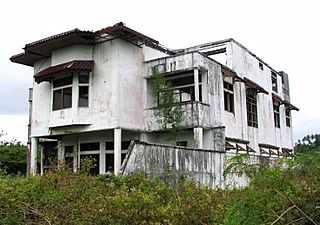 The killing is over on Ambon, the hub of the Moluccas, or Spice
Islands, in Indonesia. There is an invisible line drawn between the
Christian and Muslim sectors in the City – it is still dangerous to
stop on the wrong side. The burnt out churches, houses and even
university buildings are reminders of the carnage that occurred a
short while ago, when Ambon was likened to Beirut at its worst.
“So it was a religious war?” I enquire. “Not really,
more the result of political manoeuvrings. Now we have peace and
democracy, but no jobs, clean streets or reliable infrastructure,
the opposite of neighbouring Singapore.” Almost incredibly,
fair and trouble-free elections had just been completed, much to
the surprise of the incumbent president, who refused to accept
defeat. “I would rather be in the hands of the Chinese army
than the Indonesian”, a French photo-journalist told us later,
after describing how he had to injure himself to persuade the
Chinese soldiers to release him. “You won't be killed or
“disappear” in their custody.”
The killing is over on Ambon, the hub of the Moluccas, or Spice
Islands, in Indonesia. There is an invisible line drawn between the
Christian and Muslim sectors in the City – it is still dangerous to
stop on the wrong side. The burnt out churches, houses and even
university buildings are reminders of the carnage that occurred a
short while ago, when Ambon was likened to Beirut at its worst.
“So it was a religious war?” I enquire. “Not really,
more the result of political manoeuvrings. Now we have peace and
democracy, but no jobs, clean streets or reliable infrastructure,
the opposite of neighbouring Singapore.” Almost incredibly,
fair and trouble-free elections had just been completed, much to
the surprise of the incumbent president, who refused to accept
defeat. “I would rather be in the hands of the Chinese army
than the Indonesian”, a French photo-journalist told us later,
after describing how he had to injure himself to persuade the
Chinese soldiers to release him. “You won't be killed or
“disappear” in their custody.”
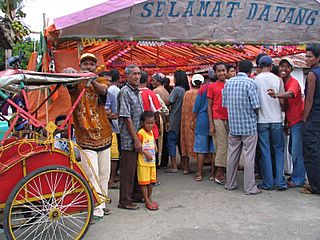 With two friends I drove across the spine of Ambon to Hila, an old
village overlooking the much larger island of Ceram, passing
countless cloves and nutmegs drying in the sun on the roadside. It
was hard to believe that centuries ago such spices were valued more
highly than gold, with the result that the islands were a
battle-ground for the colonial powers, ending when we swapped our
land there for New York, after smuggling out seedlings to establish
plantations in India! We hiked up a steep trail, through spice
plantations, to a ridge with a spectacular view over the partially
forested hillsides. Here we strove to observe two species of
parrots endemic to these islands, which we could hear but not see.
We returned early the following morning and were rewarded by the
sight of the electric Moluccan Red Lory and the “poorly
known”, to quote the bird book, but well-named Drab
Honeyeater. On the drive back to the airport, we stopped to chat
and photo the friendly locals, many of whom were Muslims.
With two friends I drove across the spine of Ambon to Hila, an old
village overlooking the much larger island of Ceram, passing
countless cloves and nutmegs drying in the sun on the roadside. It
was hard to believe that centuries ago such spices were valued more
highly than gold, with the result that the islands were a
battle-ground for the colonial powers, ending when we swapped our
land there for New York, after smuggling out seedlings to establish
plantations in India! We hiked up a steep trail, through spice
plantations, to a ridge with a spectacular view over the partially
forested hillsides. Here we strove to observe two species of
parrots endemic to these islands, which we could hear but not see.
We returned early the following morning and were rewarded by the
sight of the electric Moluccan Red Lory and the “poorly
known”, to quote the bird book, but well-named Drab
Honeyeater. On the drive back to the airport, we stopped to chat
and photo the friendly locals, many of whom were Muslims.
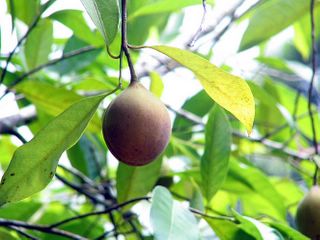 The main reason for going to Ambon was to take a flight to the
rarely visited Tanimbar Islands, some two hours east of Ambon. The
only flights were with Merpati, whose slogan “Get the
feeling” aptly described schedules in these parts as feelings
were all you could rely on, with nobody outside their office in
Ambon knowing when such flights would occur. Fortunately, we were
able to fly to Saumlaki on Yamdena, the main island of the
Tanimbars, on the desired day, a most uncomfortable experience in
an ancient 22-seater. We then discovered that we could not fly to
the relatively close Kai Islands as we wanted, flights having been
suspended, and the flight we had “booked” back to Ambon
did not run that day. As the previous day was full, we got a
booking for the day after, but no tickets as the agent had gone to
the airport to investigate why the plane had returned. The answer
was that the pilot had felt ill and so decided to come back to
Saumlaki, apparently not trusting his co-pilot to take-over.
The main reason for going to Ambon was to take a flight to the
rarely visited Tanimbar Islands, some two hours east of Ambon. The
only flights were with Merpati, whose slogan “Get the
feeling” aptly described schedules in these parts as feelings
were all you could rely on, with nobody outside their office in
Ambon knowing when such flights would occur. Fortunately, we were
able to fly to Saumlaki on Yamdena, the main island of the
Tanimbars, on the desired day, a most uncomfortable experience in
an ancient 22-seater. We then discovered that we could not fly to
the relatively close Kai Islands as we wanted, flights having been
suspended, and the flight we had “booked” back to Ambon
did not run that day. As the previous day was full, we got a
booking for the day after, but no tickets as the agent had gone to
the airport to investigate why the plane had returned. The answer
was that the pilot had felt ill and so decided to come back to
Saumlaki, apparently not trusting his co-pilot to take-over.
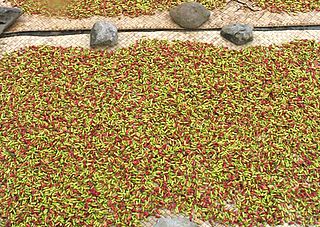 The Tanimbars are at almost the south-eastern extremity of the 5000
km long Indonesian Archipelago, only 150 km from the coast of
Australia. Unlike most of the country, the population is
predominantly Christian. At the Harapan Indah, the only hotel in
town, we arranged to stay at the owners' farm 21 km along the
island's only road, so that we had ready access to the native
forest. By the time we reached the farm, after supplies had been
purchased, including a crate of beer, it was raining – the first
time for 4 months so it was said. We had come here to try to see
the 20 or more special birds endemic to these parts, a surprisingly
high number for such a relatively small area. When the rain
stopped, we set forth, amongst much bird activity, but were
disappointed to find the extensive forest reported to be present by
the last person we knew to have visited, some 10 years ago, had
gone and only patches of logged forest remained.
The Tanimbars are at almost the south-eastern extremity of the 5000
km long Indonesian Archipelago, only 150 km from the coast of
Australia. Unlike most of the country, the population is
predominantly Christian. At the Harapan Indah, the only hotel in
town, we arranged to stay at the owners' farm 21 km along the
island's only road, so that we had ready access to the native
forest. By the time we reached the farm, after supplies had been
purchased, including a crate of beer, it was raining – the first
time for 4 months so it was said. We had come here to try to see
the 20 or more special birds endemic to these parts, a surprisingly
high number for such a relatively small area. When the rain
stopped, we set forth, amongst much bird activity, but were
disappointed to find the extensive forest reported to be present by
the last person we knew to have visited, some 10 years ago, had
gone and only patches of logged forest remained. 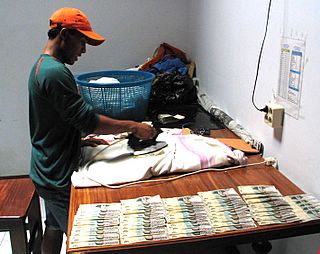 However, over the
next 4 days we saw all the specialities, including 2 parrots, 2
thrushes and 5 flycatchers, apart from the Tanimbar Scrubfowl,
sadly scarce or elusive due to hunting, and the Pied Bronze Cuckoo.
Strangely, I had recorded the song of the cuckoo on the first
afternoon, but never heard it again. According to the book, it
parasitizes the endemic Rufous sided Gerygone, but the only bird to
react to the playback of its song, on several occasions, was the
Wallacean Whistler – indicating that this species is the main host
for the cuckoo's eggs.
However, over the
next 4 days we saw all the specialities, including 2 parrots, 2
thrushes and 5 flycatchers, apart from the Tanimbar Scrubfowl,
sadly scarce or elusive due to hunting, and the Pied Bronze Cuckoo.
Strangely, I had recorded the song of the cuckoo on the first
afternoon, but never heard it again. According to the book, it
parasitizes the endemic Rufous sided Gerygone, but the only bird to
react to the playback of its song, on several occasions, was the
Wallacean Whistler – indicating that this species is the main host
for the cuckoo's eggs.
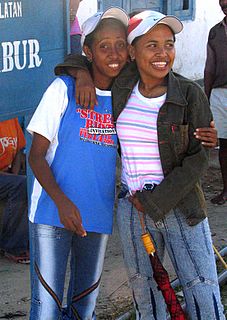 On the last afternoon, we visited the old village of Turgham. We
started at the mayor's house, where a meeting of the village
elders was in progress. After mutual greetings, we signed the
visitors book, noting that all previous visitors of the last 2-3
years looked to be either Indonesians or Australians, the latter
associated with the annual Darwin to Saumlaki boat race apparently.
At a wood-carver's house we bought a number of carvings from
the selection on offer by several local artists – good quality and
value. We were invited to drink a glass of Soli, local spirit
distilled from palm wine- highly alcoholic and surprisingly smooth.
Returning to the Harapan Indah in Saumlaki, we enjoyed the
air-conditioning, until ended by a power cut, and were amused to
observe the staff ironing banknotes flat, perhaps to facilitate
storage as even the smallest item can require a large number of
notes, the exchange rate being 16, 000 Rupiah to the pound. The
trappings of civilisation are a bit thin on the ground here: no
mobile phone cover, internet access or shopping malls. Predictably,
our flight was delayed by late arrival of the plane but this gave
us chance to study the profusion of Oriental Plovers and Little
Curlews on the runway – two species rarely encountered away from
their wintering grounds in northern Australia. It was a shame we
could not fly to Kai but we all agreed this last minute extension
to our eastern Indonesia trip had been a highly rewarding and
pleasant experience.
On the last afternoon, we visited the old village of Turgham. We
started at the mayor's house, where a meeting of the village
elders was in progress. After mutual greetings, we signed the
visitors book, noting that all previous visitors of the last 2-3
years looked to be either Indonesians or Australians, the latter
associated with the annual Darwin to Saumlaki boat race apparently.
At a wood-carver's house we bought a number of carvings from
the selection on offer by several local artists – good quality and
value. We were invited to drink a glass of Soli, local spirit
distilled from palm wine- highly alcoholic and surprisingly smooth.
Returning to the Harapan Indah in Saumlaki, we enjoyed the
air-conditioning, until ended by a power cut, and were amused to
observe the staff ironing banknotes flat, perhaps to facilitate
storage as even the smallest item can require a large number of
notes, the exchange rate being 16, 000 Rupiah to the pound. The
trappings of civilisation are a bit thin on the ground here: no
mobile phone cover, internet access or shopping malls. Predictably,
our flight was delayed by late arrival of the plane but this gave
us chance to study the profusion of Oriental Plovers and Little
Curlews on the runway – two species rarely encountered away from
their wintering grounds in northern Australia. It was a shame we
could not fly to Kai but we all agreed this last minute extension
to our eastern Indonesia trip had been a highly rewarding and
pleasant experience.
Flag Quiz
Which countries are represented by these flags? For the answers, see at the end of the eNews.

Meeting News from New York
We are sorry to say that for the time being, New York meetings are suspended as Laurie really needs a helper. If you have some time to spare and are based in or near NYC, please contact Laurie on the e-mail address below.
For details of forthcoming meetings email newyork@globetrotters.co.uk or register for email updates, click here at our website.
New York meetings are held at The Wings Theatre, 154 Christopher Street (btw Greenwich St and Washington St ), to the right of Crunch Fitness, in the Archive on the first Saturday of each month at 4 pm .
Meeting News from London by Padmassana
February 2005 London meeting
Gerry Brennan was our first speaker and gave us an insight into life in Botswana. Gerry went there to teach Art & Design. She began with slides showing some of her pupil's work. The children are expert at making sculptures from wire. Gerry showed us some of Chobe National Park's 11,000 square kilometres, home to elephants, lion and buffalo, some of which get extremely close. Gerry also explained some of the local superstitions, my favourite being her picture of a house surrounded by green fields, however the area around the house had no grass, as the locals believe that snakes live in the grass and they are scared of them!
Our second speakers were duo Shally and Richard Hunt, whose talk entitled “No ordinary walk” was their 2300 mile, 40 week walk from Cape Wraith to Nice. Though they did the first part in reverse walking from Dover to the north of Scotland before hopping over the Channel and walking in the summer heat through Belgium, Luxembourg and France. They crossed both the Jura and Vosges Mountains, sleeping in refuges and camping. After 40 weeks they finally made it to Nice in the rain.
5th March 2005 London meeting
Our first speaker was Matthew Leeming who gave Globies a fascinating talk on Afghanistan. Matthew began in the city of Herat, where he visited the beautiful Friday mosque with its wonderful blue tiles. We saw the tile factory where the tiles are still made by hand today. From Shibagan he showed us the solid gold jewellery which had escaped melting down by the Taliban by being hidden in a bank vault.
In Balkh we saw the worlds oldest mosque dating from 950AD, the mosque of the 9 domes, which is housed under a roof now to protect it from the elements. And the views of the spectacular mountains in the east of Afghanistan finished off a great talk.
Our second speaker was long time Globie Phil Koniotes whose slides took us to Svalbard and Greenland. The Svalbard part was actually the honeymoon of Phil and fellow Globie Lindy, who met at Globetrotters, all together, aaaaaaaahhhhhh! Their trip took them to see the wildlife of Svalbard where they saw Arctic Fox and all kinds of bird life, as well as enjoying Russian hospitality including BBQ's on board their ship. In Greenland Phil showed us the old whaling stations which are dotted around. Phil's fabulous icebergs photos showed the deep blue colours of the oldest chunks of ice. He was also lucky enough to spot a Polar bear and to see a hump back whale feeding frenzy.
By Padmassana
London meetings are held at The Church of Scotland, Crown Court, behind the Fortune Theatre in Covent Garden at 2.30pm the first Saturday of each month. There is no London meeting in August, but we will be back in September. For more information, you can contact the Globetrotters Info line on +44 (0) 20 8674 6229, or visit the website: www.globetrotters.co.uk
